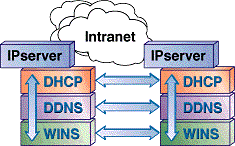|
Shadow IPserver: Fault
Tolerance
Only replicated servers can be deployed with
confidence
IPserver pairs eliminate a single point of
failure.
Automated IP address management simplifies administration, reduces
cost, and improves flexibility. Other DHCP implementations have
also promised these benefits. However, as a new single point of
failure, these same systems compromise network
availability.
Through unique and
powerful replication technology, Shadow IPservers deliver the
benefits of a dynamic IP network without introducing a single point
of failure.

Shadow's services collaborate in real time
for reliability and integration.
Backup is not sufficient.
Do you save the memory-resident database from your router to disk?
Of course not--the snapshot would become obsolete immediately. For
the same reason, a disk backup of dynamic IP address assignments
will not guarantee availability.
Frustrated with the
futility of database backup, some users have experimented with
deployment of multiple servers, each carefully configured to
service "half-subnets". The result is complex to administer, and
wastes valuable address space.
Instead Shadow IPservers
can be deployed in pairs with real-time replication. These pairs
constantly communicate to offer the following:
- Replication: Whenever anything in the
memory-resident database of one server changes, the other is
notified and makes the change. Changes may result from server
operations, by client request, or from an administrator management
command.
- Load-balancing: While both servers are
operational, they provide load balancing for client
requests.
- Two-phase
synchronization: Before a server grants a client an IP
address and configuration, it synchronizes with its peer server,
preventing database conflicts. After the assignment, it confirms
the change with its peer.
- Uninterrupted
service: If one server goes offline, the other server
continues to service all clients.
- Automatic
re-synchronization: When a server comes back online, it
automatically synchronizes its database with the peer.
Enable responsive, centralized configuration
using short lease times.
If, for any reason, a DHCP server becomes unavailable, it impacts
not only new clients who cannot attach to the network, but existing
clients currently using the network. When an address lease expires,
open network connections are simply abandoned and associated
network applications will quit working, or crash.
Alternative automated IP
management implementations limit the risk of disruptions by
configuring very long lease times (a week to a month) as a hedge
against server failure.
But long lease times
reduce the value of automated systems. Long lease times mean
clients are slow to learn about changes in the network environment,
paralyzing the network and the administrator's ability to meet the
needs of the business. Long lease times limit the ability to reuse
scarce addresses, and may not be feasible for implementation of
VLANs or policy-based management.
Perform all system administration online without
downtime.
Because Shadow IPservers are fully replicated as peers, system
administration does not require scheduled downtime. This also means
that servers can be updated, moved, or replaced on-line as
necessary during normal working hours with no disruption to
services.
|

